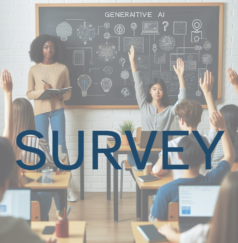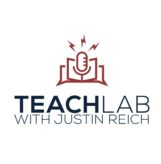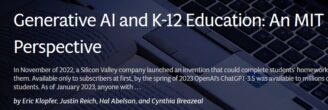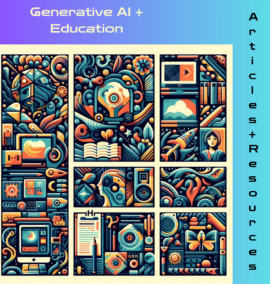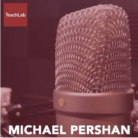Generative AI
TSL is currently studying how the arrival of generative AI technologies is affecting school environments. We're interviewing teachers, as well as parents, administrators and students to learn more about tools like GPT4 and DALL-E, which are now available to most students, whether school districts permit them or not.
Teachers, Students, School Leaders!
In 2022, Silicon Valley invented a machine that can do many students' homework for them. With the release of ChatGPT in November 2022, the 2023-2024 academic year is the first full school year where new generative AI tools have been widely available to educators and students. The MIT Teaching Systems Lab at the Massachusetts Institute of Technology (M.I.T.) is conducting a study to better understand the experiences of teachers, students, school administrators, and district leaders, during the 2023-2024 school year. We’re particularly interested in the arrival of generative AI technologies in school environments, and whether GenAI is having an impact on your school or classroom. We want to hear your experiences, observations, and insights
We've shared early findings in a Teachlab Podcast Episode, Dispatches from the Integrity Trenches.
New Teachlab Episode: Dispatches from the Integrity Trenches
The Arrival of AI powered tools like ChatGPT (now GPT4) in schools has generated concerns that students would use the tool to bypass cognition, or, “cheat” as we colloquially call it. And, it appears many students are doing just that.
PLEASE TAKE OUR SURVEY!
WE WANT YOUR PERSPECTIVE ON GENERATIVE AI IN SCHOOLS
Generative AI + Education Survey for Educators, Parents, and Students In the last year, generative AI services like ChatGPT and DALL-E have arrived in school environments, regardless of whether teachers and school leaders want them or not. MIT's Teaching Systems Lab is collecting information about educators and school administrators experiences and attitudes towards generative AI. This survey will be used to identify research questions, and potentially recruit participants for a qualitative research study. We've attuned the questions to teachers and administrators, but if you're a parent or student with thoughts to add, you're welcome to fill it out.
Generative AI and K12 Education: An MIT Perspective. In November of 2022, a Silicon Valley company launched an invention that could complete students’ homework for them. Available only to subscribers at first, by the spring of 2023 OpenAI’s ChatGPT-3.5 was available to millions of students. As of January 2023, anyone with internet service can access the next generation, GPT-4, using Microsoft’s Bing, for free. ChatGPT and other emerging models like it are a form of generative AI, and its widespread availability poses new challenges and opportunities for schools. The response from educators falls along a spectrum, of enthusiasm and optimism on one side, and fatigue, bitterness, and pessimism on the other, and commonly, a mix of positive and negative attitudes. The optimists, the pessimists, and the ambivalent all agree that the sudden, widespread availability of generative AI has been a jolt that has left them scrambling to adapt for the past year.
Responsible AI for Social Empowerment and Education (RAISE)
Artificial Intelligence is transforming our personal and professional lives. Around the world, governments, companies, and institutions are proclaiming that we are entering the “era of AI” with the rapid development of intelligent devices that can recognize faces and interact via speech, robots that can work alongside people to help automate warehouse logistics and manufacture goods, algorithms that can generate novel photo realistic images and music, computers that can provide decision support to clinicians to help detect cancer more reliably, and so much more. In every feat that AI can do, however, there lurks potential for misuse and the spreading of inequity. AI education can help change that.
RAISE (Responsible AI for Social Empowerment and Education) is a new MIT-wide initiative headquartered in the MIT Media Lab and in collaboration with the MIT Schwarzman College of Computing and MIT Open Learning. In the face of this accelerating change, our research and impact mission is to advance equity in learning, education and computational action to rethink and innovate how to holistically and equitably prepare diverse K-12 students, an inclusive workforce, and lifelong learners to be successful, responsible, and engaged in an increasingly AI-powered society.
Further Resources for Understanding Generative AI and its Impact on Education There is a dizzying array of articles, videos, white paper, podcast episodes, editorials and other material written for educators about Generative AI. Our colleague Josh Sheldon assembled some of the best, most useful, and most fascinating here
Take a Deeper Dive
Related resources from Teachlab



